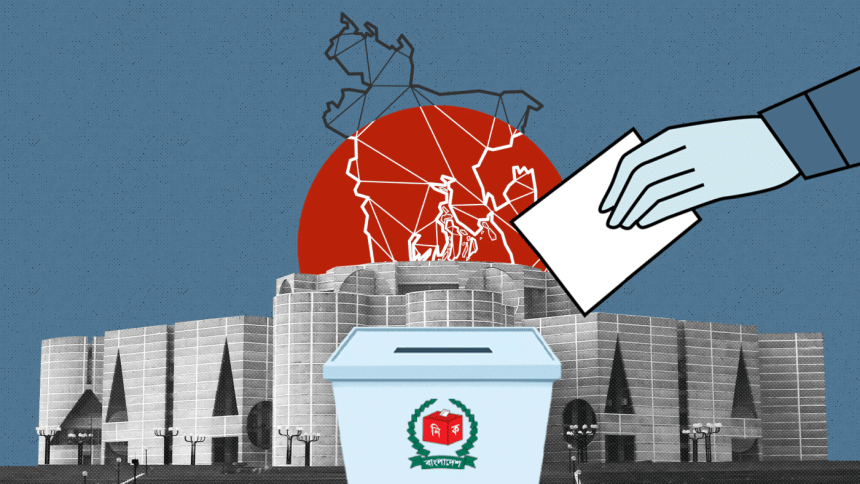Referendum question: ‘Too complicated for voters’

Despite deep disagreements over the timing of the referendum and other issues, major political parties agreed on one point yesterday -- the proposed four-part referendum question is too difficult for voters to understand.All parties that participated in drafting the July charter -- BNP, Jamaat-e-Islami, National Citizen Party, Communist Party of Bangladesh, Bangladesher Samajtantrik Dal, Bangladesh Khelafat Majlish, Ganosamhati Andolon, and the Revolutionary Workers Party -- said the set of ques...
Despite deep disagreements over the timing of the referendum and other issues, major political parties agreed on one point yesterday -- the proposed four-part referendum question is too difficult for voters to understand.
All parties that participated in drafting the July charter -- BNP, Jamaat-e-Islami, National Citizen Party, Communist Party of Bangladesh, Bangladesher Samajtantrik Dal, Bangladesh Khelafat Majlish, Ganosamhati Andolon, and the Revolutionary Workers Party -- said the set of questions for a "Yes/No" vote is illogical and likely to confuse voters.
In the July National Charter (Constitution Reform) Implementation Order, 2025, issued on Thursday, the referendum question contains four parts covering major constitutional reforms.
The question reads: "Do you consent to the July National Charter (Constitution Reform) Implementation Order, 2025, and the following proposals related to constitutional reforms mentioned in the July National Charter? (Yes/No)"
a) The election-time caretaker government, the Election Commission, and other constitutional institutions will be formed in line with the process outlined in the July charter.
b) The next parliament will be bicameral. A 100-member upper house will be formed in proportion to the votes received by parties in the national parliamentary election. Approval from a majority of the upper house will be required to amend the constitution.
c) The parties that win the next parliamentary election will be bound to implement the 30 proposals agreed upon in the July National Charter, including increasing women's representation in parliament, electing the deputy speaker and several committee chairpersons from the opposition, limiting the prime minister's term, enhancing presidential powers, strengthening fundamental rights, ensuring judicial independence, and empowering local government.
d) Other reforms mentioned in the July National Charter will be implemented as per the commitments of the political parties.
BNP standing committee member Salahuddin Ahmed said the process is fundamentally flawed, as voters have no scope to vote on the four proposals separately.
"There is only one question covering four things. That makes it a leading question," he said. "People are being forced to say 'yes' to all of them or 'no' to all of them. For example, the proposal for forming an upper house in proportion to votes is being imposed here with no option to approve or reject it separately."
Jamaat-e-Islami Nayeb-e-Ameer Syed Abdullah Muhammad Taher told a press briefing in the capital's Moghbazar that dividing the question into four parts "has placed people in a spot of bother." Analysing each point to form an informed opinion, he said, would be difficult for voters and likely cause further confusion.
Adding to the discourse, NCP Member Secretary Akhter Hossen said, "The four parts of the question contain many issues on which political parties have expressed notes of dissent during the consensus talks. It still remains unclear whether these dissenting points will be implemented according to the language of the July charter, the consensus commission's recommendations, or the individual positions of the political parties."
With this multi-parted question, some reforms have been given less importance, he added.
Communist Party of Bangladesh central leader Ruhin Hossain Prince said ordinary voters will struggle to understand the complex issues embedded in the question. "This bundling of issues will force voters to accept or reject the entire package, even if they support some reforms and oppose others."
Bangladesher Samajtantrik Dal Assistant General Secretary Razekuzzman Ratan echoed his concern, calling the question not only complex but also "unethical."
Both leaders said the question should have been simple and easily comprehensible.
Saiful Haque, general secretary of the Revolutionary Workers Party, expressed doubt whether the objectives of the referendum could be met through such a process.
Bangladesh Khelafat Majlish Ameer Mamunul Haque said in a statement that including four separate parts within a single question puts the entire process at risk.
If the referendum is held alongside the national election under party symbols, he warned, public attention will be divided and voters will struggle to properly understand or express their views on the referendum issues. "As a result, the transparency and credibility of the referendum will be undermined."
Abul Hasan Rubel, Ganosamhati Andolon executive coordinator, speaking at an event in Shahbagh, said the clauses relating to the referendum question are unclear.
He said it is the interim government's responsibility to explain each clause. He said the government should ensure that voters are fully informed about the content and process of the referendum through television, newspapers, and other media before the election.